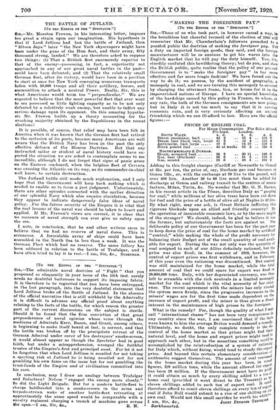"MAKING THE FOREIGNER PAY." [To THE EDITOR or THE "
Spec-mm."1 Sum,—Those of us who took part, in however casual a way, fa the breathless but cheerful turmoil of the election of 1905 sill remember that Mr. Chamberlain's followers preached to a puzzled public the doctrine of making the foreigner pay. pet a duty on imported foreign goods, they said, and the foreigo manufacturer will be on anxious to get his wares into the English market that he will pay the duty himself. You. Sir, sturdily confuted this bewildering theory; but do you, and does the British public, quite realise that the policy of our premnt Government is to "make the foreigner pay" in far more effective and far more tragic fashion? We have found out the way' to do it; we possess, by the accident of geography, monopoly in coal, and we are turning this monopoly to amount by charging the uttermost franc, lira, or krone for it to the ithpoverished nations of Europe. I have no special knowledge of the hardships mused by this policy in France, to whom, at any rate, the bulk of the German consignments are now going; but in Italy it is not too much to say that it is cawing economic ruin, and is very seriously affecting an anefent friendship which we can ill-afford to lose. Here are the official figures a—
PRICES OF ENGLISH COAL.
For Home Consumption. For Sales Abroad. Pit-head. London.
Steam smokeless, beet
44 2 58 4 .. d.
115 0
Steam best black rein, huge 41 2 .. 55 4 .. 112 8 Anthracite, best lame 40 8 54 10 .. 110 0 Block patent fuel 45 at works 62 2 ..
120 0 NORTHDREERLLHO & Decant
Steam, screened beat 36 2 50 11 .. 140 0 Gars, best (Durham) 36 8 .. 51 6 .. 110 0 Gas. second 33 8 .. 48 5 .. 102 6
Adding to this freight charges (Cardiff or Newcastle to Genoa) at 25s. per ton, the price of, say, Durham gas coal becomes at Genoa 195s., or, with the exchange at 90 lire to the pound, cell over 690 lire. Another 50 to 80 lire must then be added for discharge at Genoa and railway transit to the centres of manu facture, Milan, Turin, dm. No wonder that Mr. G. N. Barnes, in his recent article in the Times, describes Italy as "gasping for coal," while millions of her olive trees have been cut demi for fuel and the price of a bottle of olive oil at Naples is 62 lire. By what right, may one ask, is Great Britain inflicting this rigorous blockade upon an allied and friendly country? lly the operation of inexorable economic laws, or by the mere might of the stronger? We should, indeed, be glad to believe it was the former, but unfortunately the facts are against us. VA delibertite policy of our Government has been for the past year to keep down the price of coal for the home markst by artificial "control," while making the whole of the profit necessary for balancing their Budget out of the small quantity of coal avai1. able for export. During the war not only was the quantity of coal assigned to each of our Allies definitely rationed, but the price was also fixed; in the summer of 1919, however, the control of export prices was first withdrawn, and in FebruotY of this year even the rationing was discontinued. But control was still maintained for the home market, while the total amount of coal that we could spare for export was fixed at 20,000,000 tons. Italy, with her depreciated currency, was thee left to scramble with the rich neutrals in a limited monopolf market for the coal which is the vital necessity of her exist- ence. The recent agreement with the miners has only riveted the system more firmly, since the progressive increases M the miners' wages are for the .first time made dependent on the increase of export profit, and the miner is thus given a direet interest in the maintenance of high prices to the foreigner. What is the remedy? For, though the quality of what I may call "international shame" has not been very conspicuous in any country since the war, I am convinced that if the fact' were known to him the average Briton would demand a rented?. Ultimately, no doubt, the only complete remedy is the (I'. control of the home market so that prices might find Mir natural level, and the home and export prices might tend to approach each other, but in the meantime something could la accomplished by the reintroduction of a system of ration4 for Italy which, without fixing, Would tend to steady the 0101t. price. And beyond this certain elementary considerations ol arithmetic suggest themselves. The amount of coal coasta in the home market during this year has been, in nO, figures, million tons, while the amount allowed for en/ has been 20 million. If the Government must have its t it could obtain as much by every shilling added to a No:: home coal (provided it went direct to the Treasury) as eleven shillings added to each ton of export coal. it 09, therefore afford to remit eleven shillings on every ten of coal if John Bull would submit to a rise of one shilling Go own coal. Would not this small sacrifice be worth hia sIC
I am, Sir, Ac., •






































 Previous page
Previous page